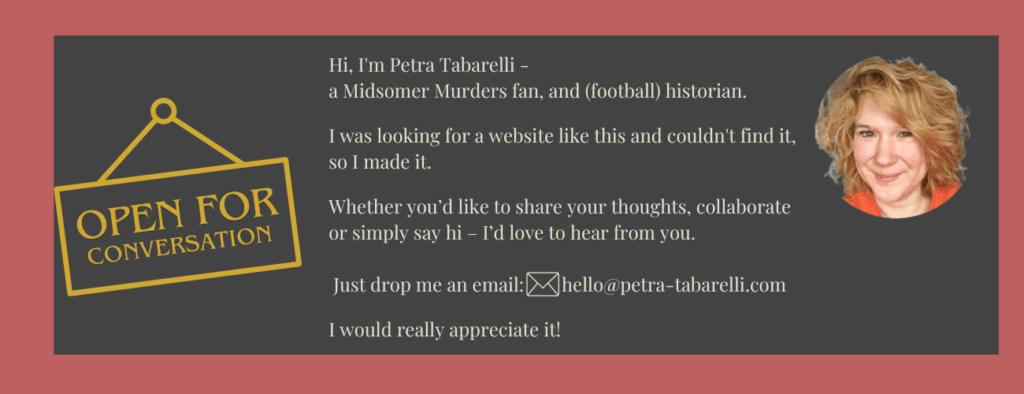
Shakespeare
Already watched: Pilot, S01, 07×03, 07×06, 09×01, 09×02, 09×03, 09×04, 09×05, 09×06, 09×07, 23×01. As well as information that I have already compiled.
Barnaby’s sergeants have little love for William Shakespeare. When Sylvia Reynolds quotes from Hamlet (‚There are more things in heaven and Earth, Horatio!‘) Sgt Winter replies sternly: “It’s Jamie.” (20×01: The Ghost of Causton Abbey)
It happens all the more frequently that Cully Barnaby is performing a Shakespeare play whose plot has similarities with the criminal case that her father Tom is currently investigating.
- Much Ado About Nothing (Pilot: The Killings at Badger‘s Drift, 08×04: Bantling Boy)
- A ‚Midsomer‘ Night‘s Dream (09×02: Dead Letters) <- ohne Cully
- Hamlet (10×03: King‘s Crystal, 20×01: The Ghost of Causton Abbey)
- Romeo und Julia (23×04: Dressed To Kill)
_ _ _ _ _ _ _ _ _ _ _ _ _ _ _ _ _
Connections between Shakespeare’s plays and the murder investigation
Much Ado about Nothing
(-> 08×04: Bantling Boy) Don Juan & Peter Craxton: Both are illegitimate children and are labelled “bastards”. This stigma characterises their lives and their social position. Both characters are deeply hurt by their role as outsiders and carry an inner conflict that expresses itself in anger and a desire for revenge. They feel hatred towards their own families, who reject or betray them. This rejection leads to a personal quest for revenge, which is directed against anyone who has injured their honour or reputation. They plan a slander with the help of an intermediary (Don Juan: Borachio and Conrad, Peter: great-uncle Geoffrey)
A ‚Midsomer‘ Night‘s Dream
(-> 09×02: Dead Letters) The episode draws a dark echo of Shakespeare’s comedy, showing how the lack of forgiveness and the insistence on an idealised memory ultimately leads to destruction. The characters here do not represent confusion and reconciliation, as in Shakespeare, but rather a fall into obsession, manipulation and the tragic clinging to an ideal. Both are about the power of desire and idealisation, about loyalty and school, and about the tragedy of love to the point of obsession. While in Shakespeare’s play the characters wake up in a reconciled state after a night of confusion, in Midsomer there is no waking up, but murder out of revenge and hurt.
Hamlet
(-> 10×03: King‘s Crystal) Alan King collected donations for a re-opening of the Midsomer Open Air Theatre until his death, but was murdered beforehand. His son Ian realises his father’s dream posthumously and chooses Shakespeare’s Hamlet as his first production to show his mother who murdered his father and her husband. Cully Barnaby plays the role of Ophelia.
Claudius’ insidious murder of King Hamlet by poison in the ear is mirrored in Charles’ murder of Alan, which is carried out by finely granulated glass in the stomach. Both methods are subtle, leave barely a trace and symbolise the insidious nature of the perpetrators. In both stories, the central motif is power and the securing of positions. Claudius covets the throne and legitimises his rule by marrying the queen. Charles pursues a similar goal by consolidating his position through marriage to his brother’s widow. The combination of murder and familial betrayal emphasises the moral reprehensibility of the actions.
Ian King takes on the role of Hamlet by exposing Charles’ guilt. Both characters are motivated by family ties to the perpetrator: Hamlet as the son of the murdered king and Ian as a close relative of the victim. This parallel emphasises the inner conflict between justice and family loyalty. Charles’ marriage to his brother’s widow mirrors Claudius’ marriage to Queen Gertrude. In both cases, this act reinforces the sense of betrayal, as it destroys not only moral but also familial ties.
Romeo und Julia
(-> Dressed to Kill) As in Shakespeare’s world-famous drama, this episode is about unhappy love and obsessive passion: Olivia Dent projects her hopes and dreams onto Nigel Bellamy, just as Romeo initially sees his unattainable love in Rosaline. Added to this are disappointed dreams and the power of fate: Olivia feels betrayed by Lois Springfield because she voted against her production of Romeo and Juliet, thereby destroying not only her professional but also her personal hopes. This betrayal becomes a “tragic stroke of fate” for Olivia, just as the feud between the Capulets and Montagues overshadows the lives of Romeo and Juliet.
The final scene with Malik and Nigel offers a redemptive twist. While Shakespeare’s play ends with the death of the lovers, this scene shows a possibility of healing through community and acceptance. Malik, the character who epitomises the successful drag production, symbolically takes on the role of Juliet, allowing the artistic vision (and perhaps new personal bonds) to live on.
🤓 Read more about Midsomer Murders & History
The Chronology of Midsomer County by Year or by Episodes • Deep Dives into Midsomer & History • History of Midsomer Murders Film Locations
I would like to point out that this is an unofficial fan site. I am not connected to Bentley Productions, ITV or the actors.
